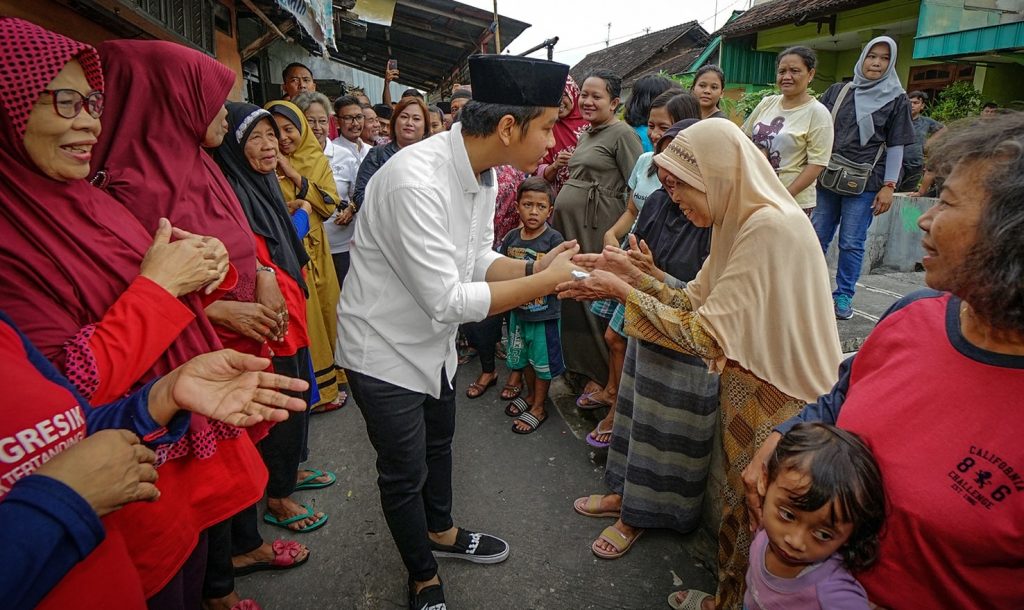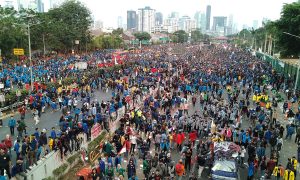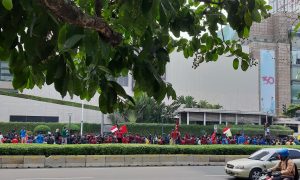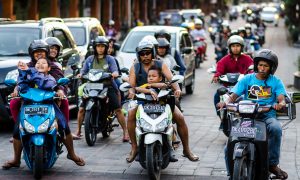Within the field of Indonesian democracy studies, it is a truth universally acknowledged that an aspiring electoral candidate not in possession of a good fortune must be in want of an oligarch. Campaigns for leadership of regional governments are famously expensive, including hefty payments for party nominations. For non-wealthy aspirants, sponsorship from self-interested business owners is the default strategy. In a 2017 survey of unsuccessful candidates, 71% admitted to receiving donations knowing that repayment was expected in the form of contracts and other benefits. But private sector donations are not the only source of material support in local elections.
Incumbent candidates have alternatives. Although some improve their re-election prospects through good performance in office, many accumulate campaign funds through corruption, exploit official assets such as buildings and cars, and manipulate discretionary funding programs. Incumbents often also harness the persuasive and coercive power of the bureaucracy to mobilise grassroots voters, a striking hangover from the authoritarian area. By several counts, incumbents succeed in around 60-65% of their re-election bids.
The factors empowering incumbents in local politics have relevance to two trends that are topical in the context of forthcoming local elections (‘pilkada’): uncontested/ single candidacy (‘calon tunggal’) elections and a new tendency for candidates in the regions to be family members of figures in national politics. In both cases, incumbents at the local level can be an obstacle to the plans of wealthy and well-connected players.
Incumbency and uncontested elections
Calon tunggal elections have been permitted since 2015. In the past two electoral rounds, and the forthcoming one, they account for roughly 9% of city and rural regency (kabupaten) elections. 28 cases have occurred to date and 23 more are expected in the next round, scheduled in December. They occur in fairly diverse circumstances, from the city of Tangerang adjacent to Jakarta, to rural and urban electorates in Central Java, to outlying regions such as North Sumatra and the Papua provinces. Some tendency to geographic ‘clumping’ is discernible.
Becoming a calon tunggal requires a candidate to ‘scare-off’ or otherwise exclude potential opponents. In some cases, candidates are overwhelmingly popular, or well-networked, so that competing with them seems a waste of money. They may use wealth and connections to monopolise nominations from political parties, forcing potential opponents to contemplate the difficulty of registering as independents. Or they may inspire police action against opponents on dubious grounds.
What has become apparent in the past three rounds of elections is that incumbency is pivotal. Close correlation between incumbency and uncontested elections is prevalent in other countries as well. But in Indonesia so far, amongst 28 cases, all 27 successful calon tunggal have had that advantage. Most have been government leaders. Several were deputies. One case, in a district in West Kalimantan, was the daughter of the provincial governor. Another candidate, in a rural district in North Sumatra, was the son of the retiring incumbent and also the serving mayor of the adjacent urban electorate.
One exception that makes the rule was the election for the mayor of Makassar in 2018. A candidate connected to local oligarchic families, running with the support of almost every political party, became the first calon tunggal to proceed without incumbency. He was also the first to fail. A majority of voters selected the empty box (‘kotak kosong’) on the ballot paper, which provides a mechanism to vote ‘no’ against the candidate.
The outcome sparked widespread national commentary at the time and is again being raised in the context of the 2020 elections. An activist campaign has emerged in numerous regions to encourage voting for the kotak kosong. The precedent in Makassar is often being cited to underline the potential for success.
The threat is evidently taken seriously in some quarters. In the most high profile case, in Solo, Central Java, President Widodo’s son, Gibran Rakabuming Raka, initially seemed likely to be a calon tunggal, sparking a focused pro-kotak kosong campaign against him in mainstream and social media. When an independent candidacy abruptly appeared, observers suspected that it had been engineered by Gibran supporters to avoid any risk of a repetition of Makassar.
The central theme of kotak kosong campaigns, consistent with perceived lessons from Makassar, is the mobilisation of popular resistance to the collusion between political parties, oligarchic forces and dynasties that produces calon tunggal and denies voters a proper choice. This focus invites a question about the factors which drove the kotak kosong victory in Makassar. Did they primarily reflect a grassroots reaction? Or was the problem at the elite level—a lack of incumbent support to the candidate—as the historical evidence about calon tunggal cases might suggest? The following analysis seeks to address this question.
Makassar 2018: incumbency and people power
The incumbent mayor of Makassar, Ramdhan ‘Danny’ Pomanto, elected in 2013, was a successful former architect and self-described non-politician. Like many local leaders, he was not a party member. But he also prided himself on evidence-based policy-making. During the first few years in office, he gained a national reputation as a high-performing regional administrator, winning numerous awards from the national government and media organisations.
Having received campaign support from his predecessor, he was mindful of the need to accumulate a support base of his own. He sometimes combined good policy with smart politics, embedding ‘clientelist’ hooks in policy programs. Through public sector reforms, for example, he garnered the loyalty of bureaucrats, school teachers and community representatives: the introduction of performance incentives had programmatic logic but it also yielded partisan support.
Pomanto achieved approval ratings of over 80 percent in local polling as he approached his re-election bid. Local branches of most political parties were keen to be associated with his candidature. Unlike the election of 2013, in which he had faced nine competitors, the 2018 election seemed to be his to lose.
Things fell apart, however, fundamentally because of antipathy from powerful business and political figures—the local oligarchs. That was widely regarded as prompting the emergence of a challenger, Munafri Arifuddin, a newcomer to politics whose wife was the daughter of the major business figure in the region and the niece of the Indonesian Vice-President.
Munafri bypassed the local branches of key parties that supported Pomanto and obtained nominations direct from headquarters in Jakarta, leaving Pomanto without a party nomination. Pomanto was also interviewed by local police in connection with a dubious corruption case, which the KPK (Corruption Eradication Commission) had declined to pick up. A senior local police figure had family links to Munafri. A risk of being detained arose.
Pomanto managed to register as an independent, reportedly using bureaucrats to help him accumulate expressions of support from the community. He retained a solid lead in opinion polling. But after legal appeals from Munafri, he was disqualified for allegedly misusing his office for electoral advantage. Some experts disputed the courts’ jurisdiction and the severity of the penalty, but few doubted Pomanto was to some extent at fault. Munafri was then unopposed in the election.
This might have been the end of the story had Pomanto not been the incumbent. Under electoral rules he was permitted to return to office while the election was underway, even though he plainly had a vested interest in the outcome. The failure of the calon tunggal would result in a re-run of the election in which Pomanto could potentially participate.
Pomanto proceeded to suspend a number of city officials who he accused of being suborned by Munafri. (Some had indeed been promoted in his absence by the pro-Munafri deputy mayor.) He directed other officials to monitor and report any vote-buying or illegal tactics during the campaign. A public CCTV system, installed originally for counter-terrorist purposes, was reported as being used to detect individuals going door to door to buy votes.
Although Pomanto was obliged to ensure his administration was neutral, he made clear that he would personally vote for the kotak kosong. More direct support was evident behind the scenes. At least one former staff member became an organiser for the kotak kosong campaign.
In a reciprocal arrangement, through which the Pomanto machine supported a separate election campaign for governorship of South Sulawesi province, kotak kosong campaigning in Makassar also received outside help. By some accounts, this deal brought into play powers in Jakarta who ensured Pomanto was not detained by police. His detention would have been a boon for the Munafri campaign.
Four days before the vote, Pomanto rallied 15,000 people, including large numbers of city officials, at a Ramadan event where he spoke of the city’s achievements during his tenure. When the election outcome was announced, a triumphant motorcycle cavalcade of kotak kosong campaigners proceeded direct to his home.
Spontaneous community reactions also played a substantial role. Many ordinary Makassar citizens credited this as the primary driver. Numbers turned up to polling booths to act as unofficial monitors to ensure kotak kosong votes were properly counted. One leading kotak kosong organiser, a Gerindra cadre who objected to his party’s handling of the nomination process, told us that he had found the community predisposed to protest against the sense of oppression which accompanied the calon tunggal arrangement. In Jakarta, prominent independent analysts and senior politicians similarly perceived righteous popular resentment at the role of the parties and oligarchs. This ‘people-power’ view has since been the dominant narrative in Indonesian academic writing, with some significant exceptions.
Voter turnout was slightly lower than usual for Makassar, however. And the result was not a landslide. All in all, it seems reasonable to attribute the outcome in Makassar to a convergence between incumbent power, assiduously applied, and the emergence of a spontaneous popular campaign, with the precise balance between the two forces ultimately unclear.
Nevertheless, the case does help illuminate one reason why incumbents have been so prevalent in calon tunggal cases to date: their exclusion can raise the risk of the local administration being hostile to the non-incumbent candidate.
In 2020, three calon tunggal are endeavouring to succeed where Munafri failed, that is, by standing without the benefits of incumbency. Two are proceeding in circumstances where incumbents have been abandoned by party branches at the local level. In Wonosobo, Central Java and Pematangsiantar, North Sumatra, the parties are putting forward calon tunggal from outside of the current administrations while the incumbents remain in office.
The incumbents in both cases appear to have seriously mismanaged relations with the local parliaments (DPRD) and government officials. It is unclear whether either will attempt mustering the bureaucratic and popular support that might bolster kotak kosong sentiment. These cases may demonstrate that although incumbency is a powerful source of autonomous power, which must usually be incorporated in a successful calon tunggal arrangement, it still needs to be wielded effectively.
New dynasties and incumbents
Since the start of decentralisation in 2001, it has been common for regional leaders to utilise incumbency in order to arrange succession by family members. In the 2020 pilkada, however, a new and overlapping trend has been evident: a handful of candidates have appeared with family connections in national politics. Some of these candidates appear to be contemplating careers that use local politics as a launching pad towards ambitions at higher levels.
This form of subordination of local politics to national designs may indicate the start of a new historical phase in centre-local relations. The mechanics of its operations are different to previous patterns, relying on an ability to secure election nominations from party leaders in Jakarta rather than on support from local incumbents. As a result, incumbent local politicians, whether seeking re-election themselves or favouring succession by relatives or close associates, are more likely to be opponents than supporters.
In Kediri, Central Java, the son of Jokowi’s cabinet secretary, a newcomer to politics, has secured all available party nominations to become a calon tunggal. The incumbent is retiring but another local candidate, supported by the incumbent’s powerful family, has reportedly been displaced. The family, which has held the district head position (bupati) for 20 years, accepts the parties’ decisions, according to media reports. If that is not the true position, however, the calon tunggal may yet face problems.
Strong incumbents can also be obstacles for dynastic candidates who are not calon tunggal. In Tangerang Selatan, near Jakarta, the niece of Defense Minister Prabowo and the daughter of Vice President Ma’ruf Amin are competing against each other and an incumbent. As of September, surveys indicated the incumbent was in the lead. Similarly, in the mayoral election in Medan, North Sumatra, the President’s son-in-law is making his first foray into politics with the support of most parties, but has seemed in early days to be lagging behind the incumbent, a deputy who was elevated after the mayor’s arrest for corruption.
Meanwhile, the risk from a dissent-attracting kotak kosong campaign has been averted in Solo, where the President’s son, Gibran Rakabuming Raka, is running. But the presence of a displaced incumbent deputy mayor still remains to be managed. Achmad Purnomo’s nomination was withdrawn in favour of Gibran, sparking protests from some Solo PDIP cadres. Keeping Purnomo on side is clearly a priority for the Gibran campaign. In addition to his influence as deputy mayor, Purnomo has deep roots in local politics and the Muslim community. He also retains substantial business interests and professional standing as a pharmacist and lecturer. The current mayor, although close to Jokowi, owes his own rise partly to Purnomo.
Jokowi sensibly delivered the bad news to Purnomo personally and offered an alternative role, which was declined. Gibran has since been at pains to defer publicly to the much older Purnomo. For his part, Purnomo has appeared dignified in public. But he declined to be part of the Gibran ‘success team’.
Some former kotak kosong advocates in Solo have reportedly contemplated a ‘golput’ campaign (the lodging of invalid ballot papers to express dissent). Whether they will join forces with other Gibran opponents, some of whom are sympathetic to Purnomo, has been a subject of conjecture.
Unusually, PDIP leader Megawati Soekarnoputri and some other Jakarta-based senior figures have indicated they will campaign for Gibran in Solo personally. A weak performance there, even if it is not a loss, would no doubt reflect unhelpfully on the image of the President and the party.
As in Makassar, events in Solo and elsewhere this year show that even candidates with heavy-weight political connections and resourcing sometimes find their progress hindered by the power of incumbency.
 Facebook
Facebook  Twitter
Twitter  Soundcloud
Soundcloud  Youtube
Youtube  Rss
Rss 


